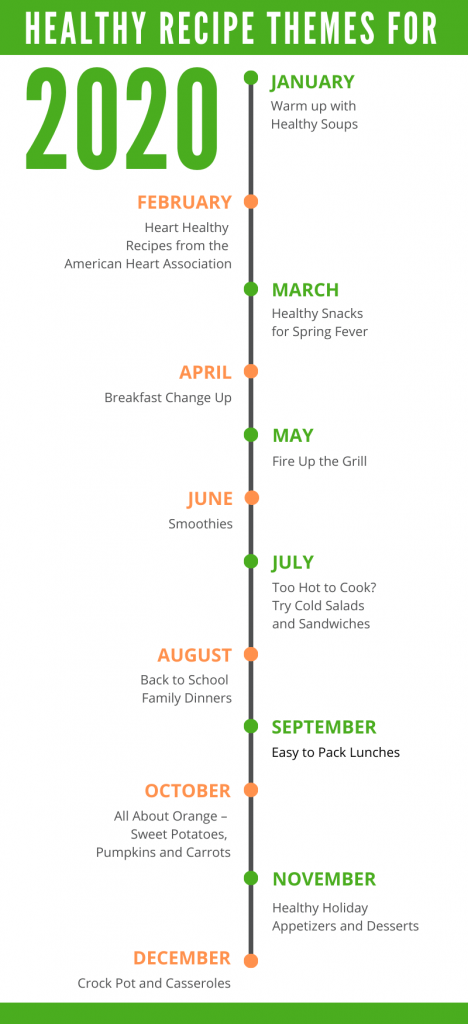
Whether you love them or hate them, a new year is a new beginning and an opportunity to start fresh. Often, good intentions for a better year lead to unrealistic expectations, and, by the time Valentine’s candy comes around, goals are either forgotten or just given up on.
This year, give yourself the best shot of succeeding by making these five easy but impactful resolutions for a healthier you in 2020:
- Increase Omega 3 Fatty Acids.
The World Health Organization and the Department of Health and Human Services recommend healthy adults to consume at least 250 mg of omega 3’s per day (1,2). There are numerous benefits to omega 3’s, including reducing the risk of heart disease, decreasing inflammation, and improving mental health and brain function (2). Omega 3’s are found in fatty fish like salmon, mackerel, and herring as well as in plant sources like chia and flax seeds, walnuts, and soybeans. Sprinkling some chia seeds in your smoothie, adding walnuts to your salad, or eating salmon for dinner are easy ways to include omega 3’s every day.
- Make it a Meatless Monday.
Going meat-free for one day of the week is a small change that can lead to tremendous health benefits. Many Americans consume well above their recommended meat intake (3). Replacing fried or processed meats that are high in saturated fat and cholesterol with more vegetables is one way to decrease the risk of obesity, heart disease, cancer, and diabetes. Concerned about getting enough protein? Rest assured, there are endless possibilities for meat-free meals with sufficient protein. Eggs, tofu, beans, lentils, yogurt, low-fat milk, and quinoa are great sources of protein to enjoy in place of meat. If you need inspiration for recipe ideas, ask your local AmFam dietitian!

- Try a New Recipe Every Week.
Or if that is too daunting, try a new recipe each month. A common complaint with healthy eating is that meals can get boring and repetitive, but it doesn’t have to. If you feel stuck and are tired of eating the same meals, trying a new recipe each week is one way to add variety and interest. Dust off your cookbooks or do a quick Google search for some healthy recipes. With more ideas and practice in the kitchen, you’ll gain more confidence and become more creative with new foods.
- Pack Your Lunch.
Both your waistline and your wallet will thank you for this one. When you pack a lunch, you can control what goes into your meal. Restaurant lunches, on the other hand, usually come with a higher price both in terms of calories and cost. When planning a lunch, include a good source of lean protein, like grilled chicken, black beans or fish, complex carbohydrates such as brown rice or whole grain bread or crackers, and a veggie and/or fruit to keep you feeling satisfied for the rest of the work day.
- Eat One Meal without Distractions Each Day.
There is no doubt about it – life is busier than ever and shows no signs of slowing down. Eating on the go when you are rushed is rarely enjoyable and oftentimes is packed with calories and unhealthy choices. On the other hand, eating meals mindfully and without distractions can increase overall satisfaction and promotes a healthy response to hunger and fullness cues. Start with a goal of one mindful meal a day, whether it be sitting down with your family or loved ones for dinner or savoring the flavor of a meal by yourself.
Making high impact goals that are specific and realistic, like the ones listed above, will benefit your health plus they are easy to keep. But if you fall off of any of your resolutions, just jump back in at any time of the year. Let’s make 2020 the best year yet!
Sources:
-
World Health Organization (2008). Interim Summary of Conclusions and Dietary Recommendations on Total Fat & Fatty Acids. Geneva: FAO/WHO, pp.1-13. https://www.who.int/nutrition/topics/FFA_summary_rec_conclusion.pdf?ua=1
-
S. Department of Agriculture and U.S. Department of Health and Human Services. Dietary Guidelines for Americans, 2010. 7th Edition, Washington, DC: U.S. Government Printing Office, December 2010. https://health.gov/dietaryguidelines/dga2010/dietaryguidelines2010.pdf
-
Delimaris I. (2013). Adverse Effects Associated with Protein Intake above the Recommended Dietary Allowance for Adults. ISRN nutrition, 2013, 126929. doi:10.5402/2013/126929 https://www.ncbi.nlm.nih.gov/pmc/articles/PMC4045293/
Article contributed by Marlee Shepard
Marlee Shepherd, Marlee Shepherd, Registered Dietitian, earned her Bachelor of Science in Dietetics from James Madison University. Marlee completed her dietetic internship with Virginia State University and gained her Registered Dietitian credentials in 2019. During her internship, Marlee enjoyed all aspects of nutrition, especially nutrition counseling because it helps people gain confidence in their food choices and develop a healthy relationship with food and their bodies. Marlee finds it exciting to be part of the growing and ever-changing nutrition field, and she loves staying current by reading the latest nutrition research and fads. Her areas of specialty include intuitive eating, diabetes, weight loss, and plant-based diets. When Marlee is not working, she enjoys hiking around the James River, trying new recipes, reading, and travel. She’s lived in Australia and has a passion for Spain. She plans one day to head to Tokyo.






